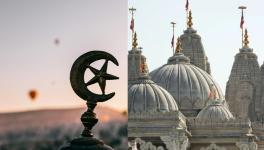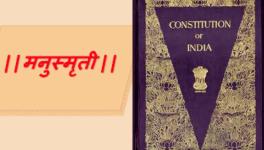Ever-Growing Catalogue of Hate Crimes in India

Last weekend began with a set of ghastly images on my social media feed: a man with his hands tied sans feet and head. One severed foot and the head were in two separate pictures, lying on a railway track in the Belgavi district of Karnataka. The man was Arbaz Mullah, and he paid the price for falling in love with a Hindu woman. According to his family, Arbaz went missing on 27 September and was murdered on 28 September. The grotesque crime is suspected to have been committed by members of Sri Ram Sena, a five-decade-old right-wing Hindu group.
The brutal sight of Arbaz’s dismembered body comes barely a week after Maynal Haque fell to a hail of bullets from a horde of Assam police personnel. Subsequently—in his last throes of life—he was repeatedly stomped upon and punched by a photographer hired by the Darrang district administration.
In between these two brutal deaths, Manish Gupta, a businessman from Kanpur, died in Gorakhpur after allegedly being assaulted by Uttar Pradesh police personnel. News reports since his death indicate he had gone to the pocket borough of the chief minister to see its progress since the ruling Bharatiya Janata Party (BJP) came to power in the state in 2017.
Soon after the outrageous images of Arbaz’s dead body spread across the web, a number of accounts started claiming that the news of his death and the photos depicting his decapitated body were fake. An account sprung up in Arbaz’s name, asserting he was alive. The state government, however, has maintained radio silence over the incident. Karnataka Chief Minister Basavaraj Bommai is yet to comment on the incident or visit Arbaz’s stricken family.
Haque—whose name was in the National Register of Citizens—and his fellow dwellers of the riverine areas in Dholpur were swiftly labelled “encroachers” and “infiltrators” to justify their treatment by the state. His family, which includes three young children, has not been visited by the Assam Chief Minister either. The Haque family lies in wait for justice and compensation for their insurmountable loss.
Gupta’s case, however, saw a different treatment from the state and mainstream media. His wife’s cries and pleas for justice were broadcast across TV screens; she was visited by Chief Minister Yogi Adityanath as well as the leader of the opposition Samajwadi Party, Akhilesh Yadav; was offered a government job and awarded compensation worth Rs. 10 lakh. Furthermore, the six police personnel involved in the lead up to Gupta’s death have been booked for murder.
Arbaz’s killing comes exactly six years since the lynching of Mohammad Akhlaq on 28 September 2015, in Dadri, Uttar Pradesh. Akhlaq was the first victim of the brutalisation Muslims in India have faced since the BJP came to power in 2014.
The names of Muslim victims have stacked up steadily since then: Pehlu Khan, Hafiz Junaid, Qasim and Shamiuddin, Tabrez Ansari, Asif Khan, Asifa Bano, Billal Mia, Joyed Hussain and Saiful Islam, Faisal Hussain, Mohammad Faisal Siddique, Irshad Sheikh, Sabir Khan, Sameer Chaudhary, Mohammed Sadiq and Mohammed Aman, Zamin Ali, Mohammad Ausaf and Zaid, Aquil Qureshi, Zahid Ahmad Bhat, Mohammad Shera, Sunawwar Khatoon, Sohail Khan, Mohammad Afrazul are just some of the names in a seemingly unending list, each conjuring a receptacle of utter helplessness in the face of the murderous rage of terrorising mobs; all filmed to be broadcast to the world in a show of Hindu supremacy and, conversely, Muslims’ powerlessness in “new India”.
This list of names is by no means exhaustive. And the catalogue of horrors keeps expanding at an alarming pace.
In many instances, the lynching has been succeeded by a show of mass support from the public for the alleged criminals and their acts. In a perverse turn of events, Naresh Kumar—the main suspect in the lynching of Hafiz Junaid—was one of the speakers at the mahapanchayat to support the killers of the gym instructor, Asif Khan.
While crimes motivated by religious reasons are not a new phenomenon in the country, the impunity on display over the last few years has been stunning. The murders and assaults have been recorded and perpetuated over social media, ostensibly in the hope of reward, which have duly arrived: election tickets for some and garlands from a Union minister for others.
In his essay, “After Nehru”, renowned historian Perry Anderson makes the point that the BJP succeeded the Congress party in government due to its “ability to articulate openly what had always been latent in the national movement”. In India’s case, the latent was Hindu confessionalism.
He writes: “In the history of 20th-century nationalism, there is a distinct sub-group in which religion played a central organising role from the start, providing, so to speak, the genetic code of the movement. The most significant cases are those which eventually founded stable parliamentary democracies. The three leading states of this type in the world today are Ireland, Israel and India. In all three, the nationalist party that came to power after independence—Fine Gael, Mapai, Congress—distanced itself from the confessional undertow of the struggle without ever being able to tackle its legacy head-on.
“In each case, as the ruling party gradually lost its lustre, it was outflanked by a more extreme rival that had fewer inhibitions about appealing directly to the theological passions aroused by the original struggle: Fianna Fail, Likud, BJP. The success of these parties was due not just to the faltering of the first wave of office-holders, but to their ability to articulate openly what had always been latent in the national movement, but neither candidly acknowledged nor consistently repudiated. They could claim, with a certain justice, to be legitimate heirs of the original cause. In each case, the setting was a parliamentary system, in which they operated constitutionally, if in each case with certain pre-war sympathies for European fascism. Jabotinsky, founder of the line leading to Likud, was an admirer of Mussolini; the RSS (Rashtriya Swayamsevak Sangh), the organisation underpinning the BJP, looked to National Socialism.”
It is a remarkable achievement that the Indian state has successfully maintained its façade of democracy to the outside world despite criminalising dissent, jailing critical voices en masse, failing to prosecute blatant hate speech when it comes to its constituents, allegedly illegally surveilling its own citizens, unconstitutionally removing Article 370, and promulgating the inherently exclusionary Citizenship Amendment Act (CAA).
Indeed, a state with majoritarian bias built into its constitution, legislature passing prejudicial laws, non-state paramilitary forces running amok with impunity, executive giving a free hand to its intelligence and law enforcement agencies, and a judiciary with a chequered history of discriminatory rulings is a confessional state even if it does not say it in as many words in its Constitution.
Keeping up appearances makes for good sound bites at international forums. As sociologist Sammy Smooha writes in his essay, “The Model of Ethnic Democracy: Israel as a Jewish and Democratic State”, “It is presumed that ethnic democracy is always preferable to Herrenvolk democracy due to its democratic façade, and it is retained only as long as the majority is able to exercise its hegemony.”
Incidentally, on the same day that Arbaz’s death became news, prominent Hindu priest Paramhans Acharya Maharaj vowed to commit jal samadhi unless the Union government declared India a Hindu rashtra. He is alive and well.
The author is an independent writer. The views are personal.
Get the latest reports & analysis with people's perspective on Protests, movements & deep analytical videos, discussions of the current affairs in your Telegram app. Subscribe to NewsClick's Telegram channel & get Real-Time updates on stories, as they get published on our website.
























